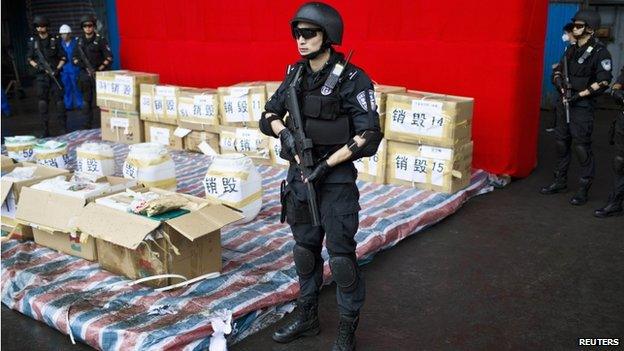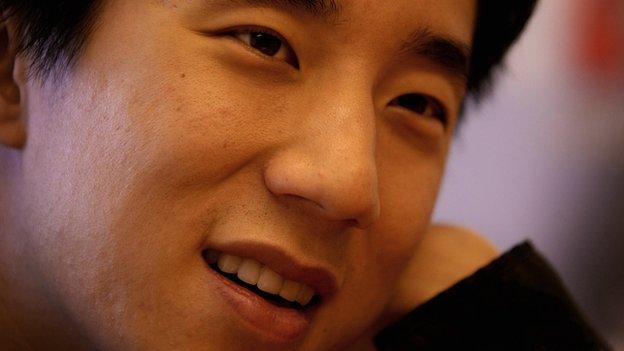China media: Marijuana legalisation
- Published

Authorities have intensified their crackdown on illegal drug use in China
Media and experts dismiss calls to legalise marijuana in China in the wake of the arrest of several celebrities on drugs-related charges.
Hollywood star Jackie Chan's son Jaycee and Taiwanese actor Kai Ko were detained on Thursday for suspected drug use.
This comes after Gao Hu, a 40-year old mainland actor, became the ninth Chinese celebrity to be arrested for drug-related offences this year.
Amid the crackdown, some netizens have suggested the use of marijuana should be legalised because "it is not the most dangerous substance".
China has kept a tight control on drugs with President Xi Jinping calling for "forceful measures" to tackle illegal drug use in June.
Dismissing netizens' suggestions, state-run People's Daily, external gathers experts' opinion and concludes that it will be "disastrous" if the substance is legalised.
"In a big country like China, if we legalise marijuana, it will be disastrous for the whole society," says a drug rehabilitation worker.
Li Wenjun, a drug expert at the People's Public Security University of China, adds that marijuana causes addiction even though it is known as a "soft drug".
"Do not simply believe the lie that one will not get addicted by just a simple smoke. Banning drugs is the responsibility of the society and everyone has to fight the war on drugs," he tells the paper.
A commentary on the daily's website, external says those who are calling for legalising marijuana are "ignorant".
"It is not an issue of freedom of speech or rights. It is about whether society allows anyone to get confused between truth and falsehoods. We should never be reduced to the Sick Man of East Asia again," says the commentator, referring to a humiliating description of the Chinese society in the late 19th century following the Opium Wars.
Some media outlets note that a few countries have made the use of marijuana legal, but warn against taking similar steps in China.
"Some countries have legalised marijuana, but this should not be the reason for us to blindly follow what they have done," says an article in the Beijing Times, external.
'Passengers flee'
Elsewhere, media defend the passengers who abandoned a Shanghai Metro train coach when a Caucasian-looking man passed out.
According to the footage from the surveillance camera, external, panicky passengers rushed to the exit within seconds after the man fainted.
The incident happened on 9 August but the video started circulating on social websites in the last two days.
Some Chinese papers have noted a Wall Street Journal blog, external post that says one cannot "expect to get any help from good Samaritans" when travelling in China's subway.
Defending the passengers, several papers, external, including the state-run People's Daily, external, have "given the other side of the story".
"It is not true that nobody offered help to the man. According to the Shanghai Metro, some of these passengers reported the incident to the staff immediately," the report says, external, noting that a few helpful passengers offered sweets and even sent the man back to his hotel.
Urging the Shanghai Metro to release the full footage, an article in the Beijing News, external says that it will help "dispel the misunderstanding" that "nobody offered assistance" to the man.
The Global Times' Chinese edition, external also disagrees that the incident reflects that Chinese people have low moral values.
"As we know, there is an outbreak of Ebola virus in Africa, and the fainted man is a foreigner. Pursuing good things and avoiding danger is the basic instinct of all species, so fleeing is the first reflex action," says the paper.
BBC Monitoring, external reports and analyses news from TV, radio, web and print media around the world. For more reports from BBC Monitoring, click here. You can follow BBC Monitoring on Twitter, external and Facebook, external.
- Published20 August 2014

- Published19 August 2014
